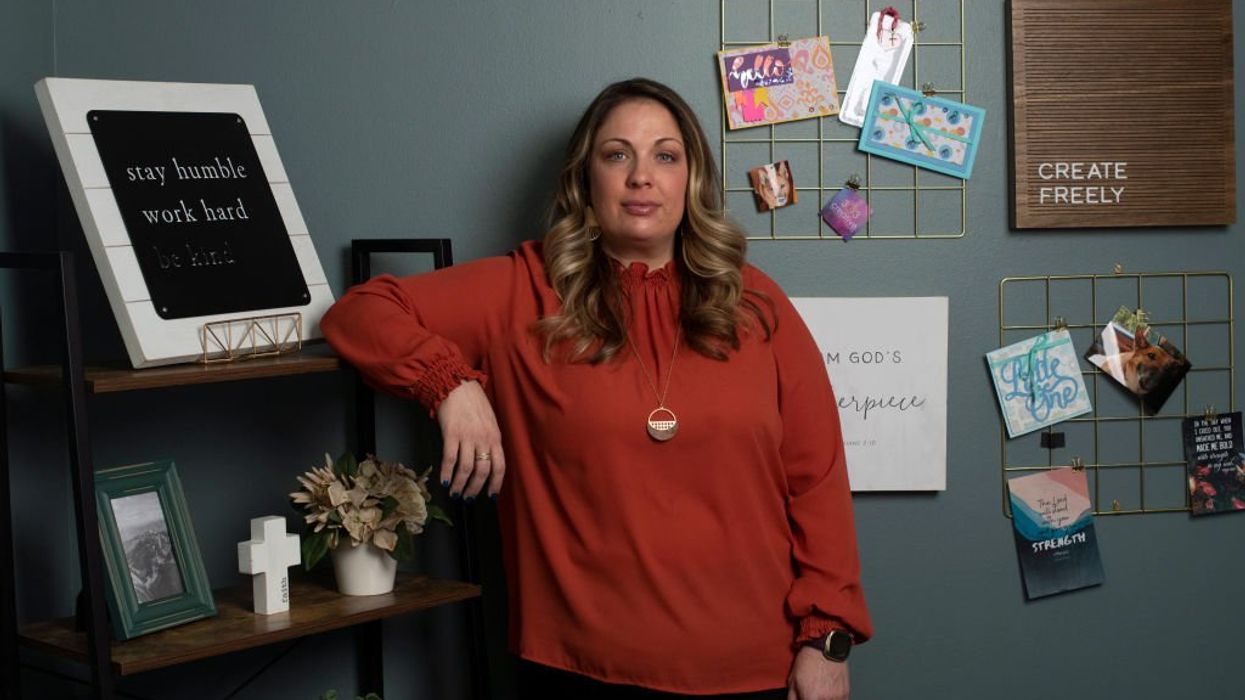
Lorie Smith of Colorado. (Photo by Rachel Woolf for The Washington Post via Getty Images)

Colorado's so-called Anti-Discrimination Act has been defanged. Now, the state has to fit the bill.
Lorie Smith is the owner of 303 Creative, a graphic design firm based in Colorado.
While generally happy to produce work for any paying customer, Smith wanted to offer wedding-related services exclusively to straight couples because complicity in the celebration of homosexual unions would otherwise "compromise [her] Christian witness." Since Colorado's Anti-Discrimination Act would have forced her to do just that, she took the Democrat-run state to court — and won.
Months after the U.S. Supreme Court ruled 6-3 in Smith's favor and a federal circuit court barred the state from enforcing the CADA's communication and accommodation clauses against the designer, Colorado officials have come to a settlement, agreeing Tuesday to pay a hefty sum to the guarantors of their defeat.
"As the Supreme Court said, I'm free to create art consistent with my beliefs without fear of Colorado punishing me anymore," Smith said in a statement. "This is a win not just for me but for all Americans — for those who share my beliefs and for those who hold different views."
Smith's original complaint filed in 2016 claimed that Colorado law stripped her and her organization "of the freedom to choose what messages to create and to convey in the marriage context."
'The First Amendment’s protections belong to all, not just to speakers whose motives the government finds worthy.'
The complaint cited a section of the CADA that prohibits a person to refuse, withhold from, or deny the "full and equal enjoyment of the goods, services, facilities, privileges, advantages or accommodations of a place of public accommodation" to an individual on the basis of sexual preference, "gender identity," and "gender expression." Another clause in the CADA prohibits individuals from advertising that refusal.
The lawsuit asked the U.S. District Court to restore the constitutional freedoms of Smith and 303 Creative "to speak their beliefs and not be compelled to speak messages contrary to those beliefs, and to ensure that other creative professionals in Colorado have the same freedoms."
The case ultimately got kicked up the Supreme Court, which decided in June 2023 that the First Amendment bars Colorado from coercing a website designer to create content with which she disagrees.
Justice Neil Gorsuch noted in the high court's majority opinion, "The First Amendment’s protections belong to all, not just to speakers whose motives the government finds worthy. In this case, Colorado seeks to force an individual to speak in ways that align with its views but defy her conscience about a matter of major significance."
"All manner of speech — from 'pictures, films, paintings, drawings, and engravings,' to 'oral utterance and the printed word' — qualify for the First Amendment’s protections; no less can hold true when it comes to speech like Ms. Smith’s conveyed over the Internet," wrote the conservative justice.
"Consistent with the First Amendment, the Nation's answer is tolerance, not coercion," added Gorsuch.
'No government has the right to silence individuals for expressing these ideas.'
Justice Sonia Sotomayor wrote in her dissenting opinion for the leftist minority that the ruling was "profoundly wrong" and will "mark gays and lesbians for second-class status."
Other social liberals similarly bemoaned the court's affirmation of free speech, including CNN talking head Van Jones, who said, "If you care about inclusion and equal opportunity and care about folks who don’t have much and are trying to make it today, this is a tragedy."
Colorado Attorney General Philip Weiser, who unsuccessfully represented the state, said at the time that the ruling was "far out of step with the will of the American people and American values."
According to Alliance Defending Freedom, the legal group that represented Smith, the Supreme Court's decision has already been cited nearly 1,000 times in court opinions, briefs, and various legal publications.
Colorado's Civil Rights Division agreed this week to pick up the bill for the CADA's defanging, covering over $1.5 million in attorneys' fees.
Weiser's office confirmed to the Denver Gazette the settlement over the fees but declined to comment.
Kristen Waggoner, the CEO and president of Alliance Defending Freedom, stated, "The government can't force Americans to say things they don't believe, and Colorado officials have paid and will continue to pay a high price when they violate this foundational freedom."
"For the past 12 years, Colorado has targeted people of faith and forced them to express messages that violate their conscience and that advance the government’s preferred ideology. First Amendment protections are non-negotiable," continued Waggoner. "Billions of people around the world believe that marriage is the union of one man and one woman and that men and women are biologically distinct. No government has the right to silence individuals for expressing these ideas or to punish those who decline to express different views."
Smith expressed hope that "that everyone will celebrate the court's decision upholding this right for each of us to speak freely."
Like Blaze News? Bypass the censors, sign up for our newsletters, and get stories like this direct to your inbox. Sign up here!